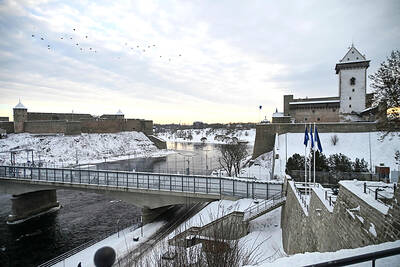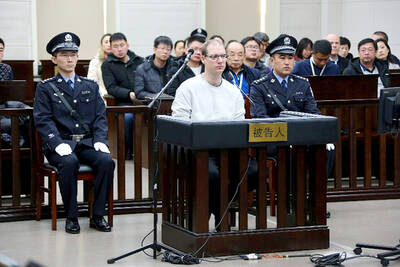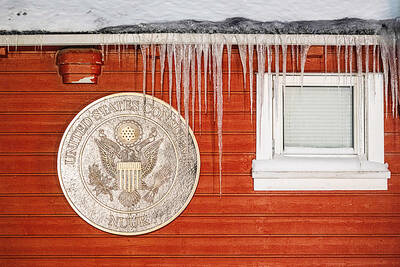Tokyo should stop apologizing over its war record, a majority of voters surveyed in a new poll said, though they were more divided on a World War II anniversary speech that angered China and South Korea.
On the eve of the 70th anniversary of the end of the war, Japanese Prime Minister Shinzo Abe expressed deep remorse over the war and said previous apologies would stand.
However, future generations should not be “predestined” to say sorry for Tokyo’s wartime record, he said on Friday last week.
The poll, published yesterday by the Yomiuri Shimbun, found that 63 percent of those surveyed agreed that Japan should refrain from saying sorry in future, while 27 percent said it should continue.
More than two-thirds of those polled supported Abe’s vow to uphold previous national apologies.
Japan’s neighbors hit out at the closely watched statement by Abe, the grandson of a wartime Cabinet minister, saying he failed to properly atone for Tokyo’s past aggression.
Voters were divided over the speech, according to the weekend poll of 1,761 Japanese households, which found 48 percent had a favorable view of Abe’s speech, against 34 percent who did not.
Despite the controversy, allies, including the US and Britain, applauded Abe’s comments and his plunging popularity appeared to get a boost, rising 2 percentage points to 45 percent.
Since taking power in December 2012, Abe has been criticized for only indirectly echoing his predecessors’ contrition over Japan’s imperial march across Asia in the 20th century.
In a possible jab at Japan’s conservative leader, Japanese Emperor Akihito on Saturday said that he felt “profound remorse” over World War II — a conflict fought in the name of his father, Hirohito.
Japan’s wartime history has come under renewed focus since Abe swept into power, and much speculation had focused on whether he would follow a landmark 1995 statement issued by then-Japanese prime minister Tomiichi Murayama.
Murayama’s statement, which became a benchmark for subsequent apologies, expressed “deep remorse” and a “heartfelt apology” for the “tremendous damage” inflicted.
Hawkish Abe has also faced increasing opposition over security bills that would allow the Japanese troops to engage in combat — to defend an ally under attack — for the first time since the war.

Two medieval fortresses face each other across the Narva River separating Estonia from Russia on Europe’s eastern edge. Once a symbol of cooperation, the “Friendship Bridge” connecting the two snow-covered banks has been reinforced with rows of razor wire and “dragon’s teeth” anti-tank obstacles on the Estonian side. “The name is kind of ironic,” regional border chief Eerik Purgel said. Some fear the border town of more than 50,0000 people — a mixture of Estonians, Russians and people left stateless after the fall of the Soviet Union — could be Russian President Vladimir Putin’s next target. On the Estonian side of the bridge,

Jeremiah Kithinji had never touched a computer before he finished high school. A decade later, he is teaching robotics, and even took a team of rural Kenyans to the World Robotics Olympiad in Singapore. In a classroom in Laikipia County — a sparsely populated grasslands region of northern Kenya known for its rhinos and cheetahs — pupils are busy snapping together wheels, motors and sensors to assemble a robot. Guiding them is Kithinji, 27, who runs a string of robotics clubs in the area that have taken some of his pupils far beyond the rural landscapes outside. In November, he took a team

DIPLOMATIC THAW: The Canadian prime minister’s China visit and improved Beijing-Ottawa ties raised lawyer Zhang Dongshuo’s hopes for a positive outcome in the retrial China has overturned the death sentence of Canadian Robert Schellenberg, a Canadian official said on Friday, in a possible sign of a diplomatic thaw as Canadian Prime Minister Mark Carney seeks to boost trade ties with Beijing. Schellenberg’s lawyer, Zhang Dongshuo (張東碩), yesterday confirmed China’s Supreme People’s Court struck down the sentence. Schellenberg was detained on drug charges in 2014 before China-Canada ties nosedived following the 2018 arrest in Vancouver of Huawei chief financial officer Meng Wanzhou (孟晚舟). That arrest infuriated Beijing, which detained two Canadians — Michael Spavor and Michael Kovrig — on espionage charges that Ottawa condemned as retaliatory. In January

SHOW OF SUPPORT: The move showed that aggression toward Greenland is a question for Europe and Canada, and the consequences are global, not just Danish, experts said Canada and France, which adamantly oppose US President Donald Trump’s wish to control Greenland, were to open consulates in the Danish autonomous territory’s capital yesterday, in a strong show of support for the local government. Since returning to the White House last year, Trump has repeatedly insisted that Washington needs to control the strategic, mineral-rich Arctic island for security reasons. Trump last month backed off his threats to seize Greenland after saying he had struck a “framework” deal with NATO chief Mark Rutte to ensure greater US influence. A US-Denmark-Greenland working group has been established to discuss ways to meet Washington’s security concerns